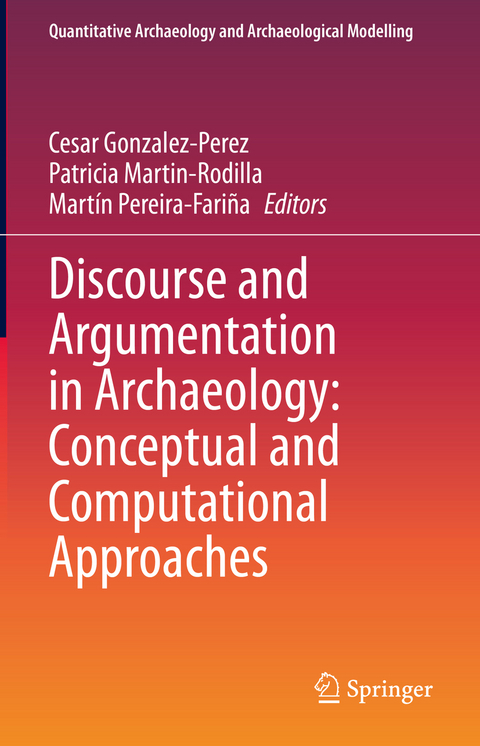
Discourse and Argumentation in Archaeology: Conceptual and Computational Approaches
Springer International Publishing (Verlag)
978-3-031-37155-4 (ISBN)
This book covers the topic of discourse and argumentation in archaeology with an aim to serve the archaeology community. The book presents discourse and argument analysis approaches and techniques in an affordable manner and applied to archaeological situations. It focuses on techniques and approaches that can be applicable to multiple situations, periods and cultures.
The book begins with an introduction to discourse and argumentation analysis as a general field and also as an auxiliary technique to archaeology. The work includes conceptual applications, ranging from causality, ontological connections, vagueness, social production of discourse and public debates. The work also devotes a section to computational approaches and describes the specifics of some well-known families of algorithms such as lexical processing, information extraction or sentiment analysis. The conclusion comments on the future and which reflects on the previous chapters and discusses how the presented techniques and approaches should be adapted or improved for easier and more powerful application to archaeology. Contributing authors bring perspectives from archaeology, linguistics, and computer science.
lt;p>Cesar Gonzalez-Perez is a Staff Scientist at Incipit CSIC, where he leads research in software and cultural heritage. His main interests are knowledge generation and communication. Cesar has edited an ISO standard, evaluates research in 6 countries, has started 3 technology-based companies, is an honorary member of Computer Applications and Quantitative Methods in Archaeology, and has authored over 100 publications.
Patricia Martín-Rodilla is currently a lecturer at the Information Retrieval Lab of the University of A Coruña. She was a postdoctoral researcher at the University of Santiago de Compostela and Incipit-CSIC, with stays in Australia, France, Chile and Portugal. She has worked on multiple archaeology and software engineering projects and has authored over 40 publications. Her main interests are areas of intersection between language, software engineering, and humanities (i.e. computational linguistics, information modelling, social networks, etc.) with a particular focus on Digital Humanities research questions and approaches.
Martín Pereira-Fariña is a lecturer at the Department of Philosophy and Anthropology of the University of Santiago de Compostela. His main interests are argumentation theory, philosophy of language and computational models for knowledge representation and reasoning. Martin has been a postdoc researcher at the Centre of Argument Technology (University of Dundee, Scotland) and at Incipit CSIC, and he has authored over 30 publications.
Chapter 1. Introduction to Discourse Analysis and Argumentation Theory (Martín Pereira-Fariña).- Part 1. Conceptual Approaches.- Chapter 2. A New Approach to Interoperable Argumentation Documentation (Stephen Stead).- Chapter 3. Making Good Arguments in Archaeology (Michael E. Smith).- Chapter 4. A Causal Model Application to a Cultural Heritage Sentence Analysis (Alejandro Sobrino).- Chapter 5. What Archaeological Texts Argue About: Denotations and Ontological Proxies (Cesar Gonzalez-Perez).- Chapter 6. The Social Production of Discourse in Archaeology (Isto Huvila).- Chapter 7. Dealing with Vagueness in Archaeological Discourses (Cesar Gonzalez-Perez).- Chapter 8. Extending Discourse Analysis in Archaeology: A Multimodal Approach (Jeremy Huggett).- Part 2. Computational Techniques.- Chapter 9. Computer Processing of Language: Where Archaeological Discourse and Computers Meet (Patricia Martín-Rodilla).- Chapter 10. NLP and Archaeology: A View from a Digital Archive (Holly Wright)- Chapter 11. Information Extraction and Machine Learning for Archaeological Texts (Alex Brandsen).- Chapter 12. Argument Mining and Analytics in Archaeology (John Lawrence).- Chapter 13. Computational Processing of Language Vagueness for Archaeological Site Modelling (Maria Elena Castiello).- Part 3. The Future.- Chapter 14. Future Directions (Cesar Gonzalez-Perez).
| Erscheinungsdatum | 05.11.2023 |
|---|---|
| Reihe/Serie | Quantitative Archaeology and Archaeological Modelling |
| Zusatzinfo | XX, 322 p. 1 illus. |
| Verlagsort | Cham |
| Sprache | englisch |
| Maße | 155 x 235 mm |
| Gewicht | 698 g |
| Themenwelt | Geisteswissenschaften ► Archäologie |
| Geisteswissenschaften ► Geschichte | |
| Geisteswissenschaften ► Philosophie ► Sprachphilosophie | |
| Schlagworte | Archaeological Argumentation • Archaeological Discourse • Argument Analysis of Public Debates about Cultural Objects • Argumentation in Context and Archaeology • Causality Analysis in Archaeology • Computational Processing of Language Vagueness and archaeology • Connecting Archaeological Discourse and Ontologies • Discourse Analysis and Argumentation in Archaeology • Discourse Modelling and Archaeology • Discourse Vagueness and Archaeology • Factual Argumentation in Archaeology • Future Directions for Discourse and Argumentation in Archaeology • Information Extraction and Machine Learning in archaeology • Making Good Arguments in Archaeology • Named Entity Recognition • Natural Language Processing • Opinion Mining and Sentiment Analysis and archaeology • Social Production of Discourse in Archaeology • Vagueness in Archaeological Discourses |
| ISBN-10 | 3-031-37155-0 / 3031371550 |
| ISBN-13 | 978-3-031-37155-4 / 9783031371554 |
| Zustand | Neuware |
| Haben Sie eine Frage zum Produkt? |
aus dem Bereich


